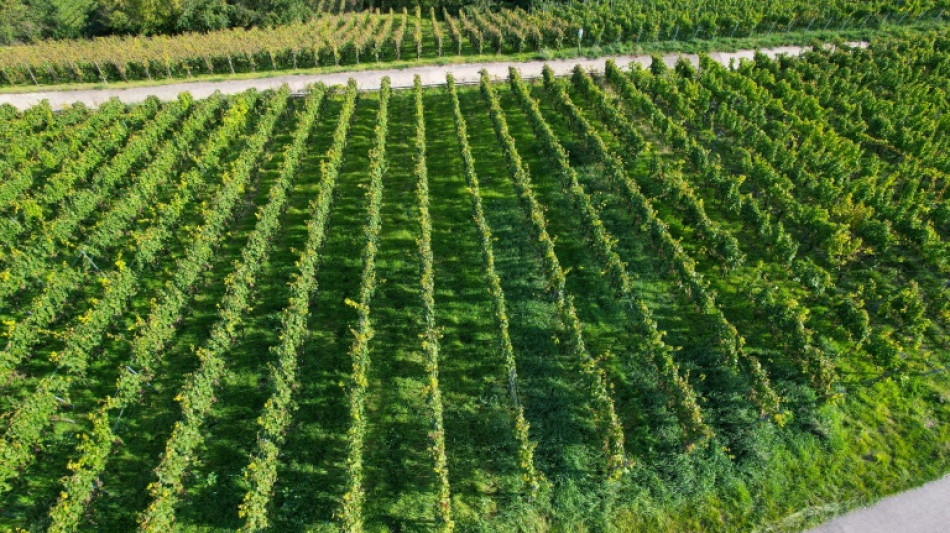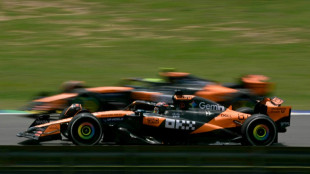
-
 England captain Stokes suffers facial injury after being hit by ball
England captain Stokes suffers facial injury after being hit by ball
-
Italy captain Lamaro amongst trio set for 50th caps against Scotland

-
 Piastri plays down McLaren rivalry with champion Norris
Piastri plays down McLaren rivalry with champion Norris
-
ECB holds interest rates as strong euro causes jitters

-
 Spain, Portugal face floods and chaos after deadly new storm
Spain, Portugal face floods and chaos after deadly new storm
-
EU close to sealing trade deal with Australia

-
 German Cup final to stay in Berlin until 2030
German Cup final to stay in Berlin until 2030
-
What does Iran want from talks with the US?

-
 Taming the lion: Olympians take on Bormio's terrifying Stelvio piste
Taming the lion: Olympians take on Bormio's terrifying Stelvio piste
-
Wind turbine maker Vestas sees record revenue in 2025

-
 Italy's Casse tops second Olympic downhill training
Italy's Casse tops second Olympic downhill training
-
Anti-doping boss 'uncomfortable' with Valieva's coach at Olympics

-
 Bitcoin under $70,000 for first time since Trump's election
Bitcoin under $70,000 for first time since Trump's election
-
'I am sorry,' embattled UK PM tells Epstein victims

-
 England's Brook predicts record 300-plus scores at T20 World Cup
England's Brook predicts record 300-plus scores at T20 World Cup
-
Ukraine, Russia swap prisoners, US says 'work remains' to end war

-
 Wales' Rees-Zammit at full-back for Six Nations return against England
Wales' Rees-Zammit at full-back for Six Nations return against England
-
Sad horses and Draco Malfoy: China's unexpected Lunar New Year trends

-
 Hong Kong students dissolve pro-democracy group under 'severe' pressure
Hong Kong students dissolve pro-democracy group under 'severe' pressure
-
Germany claws back 59 mn euros from Amazon over price controls

-
 Germany claws back 70 mn euros from Amazon over price controls
Germany claws back 70 mn euros from Amazon over price controls
-
VW and Stellantis urge help to keep carmaking in Europe

-
 Stock markets drop amid tech concerns before rate calls
Stock markets drop amid tech concerns before rate calls
-
BBVA posts record profit after failed Sabadell takeover

-
 UN human rights agency in 'survival mode': chief
UN human rights agency in 'survival mode': chief
-
Greenpeace slams fossil fuel sponsors for Winter Olympics

-
 Greenpeace slams fossel fuel sponsors for Winter Olympics
Greenpeace slams fossel fuel sponsors for Winter Olympics
-
Kinghorn, Van der Merwe dropped by Scotland for Six Nations opener

-
 Russia says thwarted smuggling of giant meteorite to UK
Russia says thwarted smuggling of giant meteorite to UK
-
Salt war heats up in ice-glazed Berlin

-
 Liverpool in 'good place' for years to come, says Slot
Liverpool in 'good place' for years to come, says Slot
-
Heathrow still Europe's busiest airport, but Istanbul gaining fast

-
 Highest storm alert lifted in Spain, one woman missing
Highest storm alert lifted in Spain, one woman missing
-
Shell profits climb despite falling oil prices

-
 Pakistan will seek govt nod in potential India T20 finals clash
Pakistan will seek govt nod in potential India T20 finals clash
-
China shuns calls to enter nuclear talks after US-Russia treaty lapses

-
 German factory orders rise at fastest rate in 2 years in December
German factory orders rise at fastest rate in 2 years in December
-
Nigeria president deploys army after new massacre

-
 Ukraine, Russia, US start second day of war talks
Ukraine, Russia, US start second day of war talks
-
Nepal's youth lead the charge in the upcoming election

-
 Sony hikes forecasts even as PlayStation falters
Sony hikes forecasts even as PlayStation falters
-
Rijksmuseum puts the spotlight on Roman poet's epic

-
 Trump fuels EU push to cut cord with US tech
Trump fuels EU push to cut cord with US tech
-
Fearless talent: Five young players to watch at the T20 World Cup

-
 India favourites as T20 World Cup to begin after chaotic build-up
India favourites as T20 World Cup to begin after chaotic build-up
-
Voter swings raise midterm alarm bells for Trump's Republicans

-
 Australia dodges call for arrest of visiting Israel president
Australia dodges call for arrest of visiting Israel president
-
Countries using internet blackouts to boost censorship: Proton

-
 Top US news anchor pleads with kidnappers for mom's life
Top US news anchor pleads with kidnappers for mom's life
-
Thailand's pilot PM on course to keep top job

| CMSC | -0.6% | 23.52 | $ | |
| GSK | 2.35% | 58.62 | $ | |
| RIO | -2.83% | 93.83 | $ | |
| BCC | -0.36% | 89.915 | $ | |
| BCE | -3.54% | 25.43 | $ | |
| NGG | -1.4% | 86.61 | $ | |
| JRI | 1.09% | 13.29 | $ | |
| RBGPF | 5.11% | 86.52 | $ | |
| AZN | 1.16% | 189.85 | $ | |
| BTI | 0.1% | 61.705 | $ | |
| RELX | 3.87% | 30.98 | $ | |
| VOD | -6.56% | 14.743 | $ | |
| BP | -2.34% | 38.3 | $ | |
| RYCEF | -1.87% | 16.62 | $ | |
| SCS | 0.12% | 16.14 | $ | |
| CMSD | -0.13% | 23.869 | $ |

Brussels extends use of controversial herbicide
The European Commission said Thursday it will allow the use of the controversial herbicide glyphosate for another 10 years, breaking a stalemate between EU states divided over its safety.
Glyphosate is one of the most widely used weedkillers in the world but critics point to evidence it may cause cancer and constitutes a risk to biodiversity.
The World Health Organization in 2015 classed glyphosate as "probably carcinogenic", spurring concerns about its continued use.
The previous European Union authorisation expired in December 2022 but was extended until December 15 this year pending a scientific study of the herbicide.
The European Food Safety Authority (EFSA) in July ended up saying it had not found "any critical areas of concern" preventing glyphosate from being reauthorised, sparking a backlash from environmental groups.
EFSA did note, however, that it had "data gaps" in reaching its assessment.
The European Commission brandished the EFSA finding as justification for continued use of glyphosate until December 2033.
It said it was forced to act now, after an October vote between EU member states and a final vote in an appeals committee on Thursday both ended in stalemate, with an insufficient weighted majority for or against.
It said it "will now proceed with the renewal of the approval of glyphosate for a period of 10 years, subject to certain new conditions and restrictions".
Those include buffer zones around fields sprayed with glyphosate and equipment to prevent the spray drifting to other areas, and urging EU countries to pay "particular attention" to effects on the environment on the herbicide's use.
- Bayer hails decision -
German chemicals giant Bayer, which uses glyphosate in its popular herbicides such as Roundup, acquired it when it bought US company Monsanto, "hailed and welcomed" the commission decision.
"This new authorisation will allow us to continue to supply farmers across the European Union with important technology for the integrated fight against weeds," a spokesman said.
But the chair of the European Parliament's environment, public health and food safety committee, Pascal Canfin, told AFP he viewed the decision as "absolutely unacceptable from a political point of view".
He noted that the renewed licence for glyphosate did not have the backing of the EU's biggest agricultural countries France, Germany and Italy, and the commission still had another month to try to come up with a workable compromise.
The EU executive could have presented "something more balanced that could have got the backing of Germany and the backing of France," said the French MEP.
In the vote Thursday, France, Germany, Italy, Belgium and the Netherlands abstained, and three countries -- Austria, Croatia and Luxembourg -- voted against a renewal.
That meant there was no qualified majority, which requires 15 out of the 27 EU countries, representing at least 65 percent of the total EU population.
France's agriculture ministry said Paris was "not against the principle of the renewal" but "regrets" that the commission did not take into account propositions to restrict its use.
A commission spokesman, Eric Mamer, said the executive believed it was "not possible to reach an agreement" among member states by December 15 so it was obliged to act.
B.Mahmoud--SF-PST




